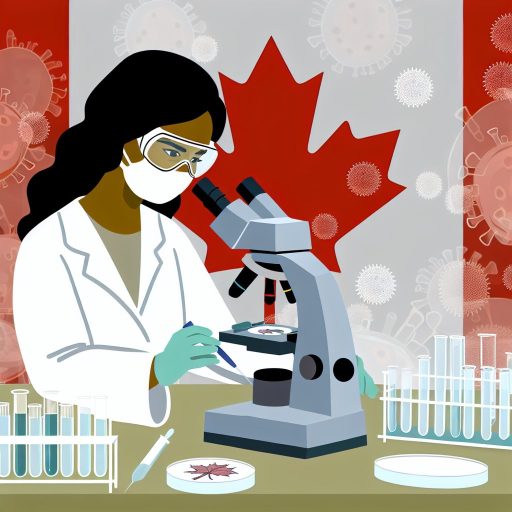Exploring the Daily Work of a Geneticist in Canada
Introduction to Genetics
Genetics is the study of heredity and variation in living organisms.
This field explores how traits are passed from one generation to the next.
It also examines the structure and function of genes.
Ultimately, genetics helps us understand the biological basis of life.
The Role of a Geneticist in Canada
A geneticist focuses on analyzing and interpreting genetic information.
In Canada, geneticists work in various settings, including universities and hospitals.
They collaborate with other scientists and healthcare professionals.
Additionally, geneticists often conduct research to advance medical knowledge.
They help diagnose and treat genetic disorders.
Daily Tasks of a Geneticist
Each day can bring diverse responsibilities for a geneticist.
They may start with reviewing genetic data and patient records.
This helps them identify potential genetic issues.
Next, they often conduct laboratory experiments.
These experiments may involve DNA sequencing or gene editing.
Moreover, they analyze results to draw meaningful conclusions.
Working Collaboratively
Collaboration is crucial in the field of genetics.
Geneticists often team up with physicians and researchers.
They share insights to enhance patient care and research outcomes.
Meetings and discussions are common to align on ongoing projects.
Continual Learning and Development
The field of genetics is rapidly evolving.
As such, geneticists must engage in continual learning.
They attend conferences and workshops regularly to stay updated.
Furthermore, reading research journals helps them keep pace with advancements.
Education and Qualifications Required to Become a Geneticist
Educational Background
A strong educational foundation is essential for aspiring geneticists.
Most geneticists begin with a bachelor’s degree in biology or a related field.
Unlock Your Career Potential
Visualize a clear path to success with our tailored Career Consulting service. Personalized insights in just 1-3 days.
Get StartedThis initial step provides basic knowledge of genetics and molecular biology.
Subsequently, many pursue a master’s degree to deepen their expertise.
A master’s program often focuses on advanced genetic concepts and research skills.
For those pursuing academia or high-level research, a Ph.D. is typically necessary.
Doctoral programs emphasize independent research and specialized knowledge.
Specialized Training
After obtaining a degree, further training is often required.
Many geneticists complete postdoctoral fellowships to gain research experience.
This training allows them to refine their skills in genetic research techniques.
Additionally, specialized certifications can enhance career prospects.
These certifications are often offered by professional organizations.
Skills and Competencies
Several key skills are critical for success in genetics.
Strong analytical skills help geneticists interpret complex data sets.
Moreover, attention to detail is vital in laboratory settings.
Communication skills are also important for sharing findings with others.
Geneticists frequently collaborate with other scientists and health professionals.
Continued Education and Professional Development
The field of genetics continually evolves with new research and technology.
Therefore, ongoing education is crucial for professionals in this area.
Attending workshops, conferences, and seminars fosters learning about recent advances.
Furthermore, engaging with professional organizations can provide networking opportunities.
These activities enhance both knowledge and career growth.
Daily Tasks and Responsibilities of a Geneticist in a Laboratory Setting
Beginning of the Day
A geneticist starts the day by reviewing ongoing experiments.
They check lab notes and any overnight results as a priority.
Next, they plan the day’s experiments and set goals.
Communication with team members occurs early in the morning.
It’s important to discuss any changes or new findings.
Conducting Experiments
Conducting experiments is a primary responsibility of a geneticist.
They perform tasks such as DNA extraction and PCR reactions.
Additionally, they run gel electrophoresis to analyze samples.
Attention to detail is crucial during these procedures.
They carefully document all procedures and results.
Analyzing Data
Once experiments conclude, analyzing data takes center stage.
Geneticists use software tools to interpret genetic sequences.
Statistical analysis helps clarify the significance of findings.
They often collaborate with bioinformaticians for complex datasets.
Maintaining Lab Equipment
Geneticists are responsible for maintaining laboratory equipment.
This includes routine calibrations and troubleshooting issues.
They keep a close eye on inventory levels of supplies.
Ordering new reagents and materials is common practice.
Team Collaboration
Collaboration is essential in a geneticist’s daily work.
They attend team meetings to discuss progress and obstacles.
Sharing insights enhances the overall productivity of the lab.
Mentoring junior researchers is also part of the role.
Engaging with the Broader Community
Geneticists often engage with the broader scientific community.
They attend conferences to present research and network.
Publishing findings in scientific journals is a key responsibility.
They contribute to seminars and workshops in their field.
Learn More: How Canadian Physicists Impact Global Scientific Research
Collaboration with Medical Professionals and Other Scientists in Genetics Research
Importance of Interdisciplinary Collaboration
Collaboration is essential in genetics research.
Geneticists work closely with medical professionals.
This partnership enhances the quality of research outcomes.
Moreover, collaboration increases the understanding of genetic diseases.
Additionally, it helps in developing effective treatment strategies.
Building Collaborative Networks
Geneticists actively build networks with other scientists.
These networks often include biologists, chemists, and bioinformaticians.
Such relationships foster knowledge exchange and innovation.
For example, geneticists often attend scientific conferences.
These events provide opportunities to meet potential collaborators.
Conducting Joint Research Projects
Joint research projects are common in genetics.
Geneticists collaborate with oncologists to study cancer genetics.
They also partner with cardiologists to explore heart disorders.
This collaborative effort leads to comprehensive research studies.
Consequently, findings have significant implications for patient care.
Sharing Resources and Facilities
Collaboration allows for resource sharing.
Geneticists often share laboratory facilities with medical centers.
This shared access maximizes the use of expensive equipment.
It also accelerates the research process.
Ultimately, shared resources lead to more efficient studies.
Engaging in Public Health Initiatives
Geneticists frequently engage with public health officials.
They work on initiatives to educate the public about genetic conditions.
This collaboration raises awareness of genetic testing options.
Furthermore, it promotes preventive healthcare measures.
These efforts contribute to overall community health improvements.
Learn More: The Importance of Geologists in Natural Resource Management
Use of Advanced Technologies and Equipment in Genetic Analysis
Overview of Genetic Analysis Technologies
Genetic analysis has evolved significantly due to technological advancements.
Modern geneticists utilize a variety of sophisticated tools.
These technologies enhance accuracy and efficiency in research.
Next-Generation Sequencing (NGS)
Next-Generation Sequencing is a groundbreaking technique.
It allows for rapid sequencing of entire genomes.
This technology produces massive amounts of data quickly.
Additionally, NGS reduces costs compared to traditional methods.
Polymerase Chain Reaction (PCR)
Polymerase Chain Reaction is essential in genetic testing.
This technique amplifies DNA segments for analysis.
Researchers use PCR to detect genetic mutations effectively.
Moreover, PCR is crucial for diagnosing infectious diseases.
Bioinformatics Tools
Bioinformatics plays a vital role in genetic research.
It involves using software to analyze biological data.
These tools assist in interpreting DNA sequences accurately.
Furthermore, bioinformatics helps in identifying gene functions.
Laboratory Equipment
Geneticists rely on high-quality laboratory equipment.
For example, centrifuges separate different components of samples.
Incubators maintain optimal conditions for cell growth.
Additionally, gel electrophoresis helps visualize DNA fragments.
Collaboration with Technology Companies
Collaboration with technology firms enhances research capabilities.
Companies like Illumina provide essential sequencing platforms.
Such partnerships drive innovation in genetic studies.
Therefore, geneticists can access cutting-edge technologies.
Discover More: Key Challenges Facing Ecologists in Canada

Ethical Considerations and Challenges Faced by Geneticists in Canada
Balancing Innovation and Ethics
Geneticists must balance groundbreaking research with ethical responsibilities.
This balance is essential to maintain public trust and compliance with regulations.
Consequently, ethical considerations shape research agendas and methodologies.
Informed Consent
Obtaining informed consent is a fundamental challenge in genetic research.
Researchers must ensure participants fully understand the implications of their involvement.
This includes potential risks related to genetic testing and data usage.
Moreover, clarity in communication fosters trust between scientists and participants.
Implications of Genetic Discrimination
Geneticists also grapple with concerns regarding genetic discrimination.
Employers or insurers might misuse genetic information, leading to unfair treatment.
Therefore, researchers advocate for robust laws to protect individuals.
This protection ensures that genetic information remains confidential and secure.
Cultural Sensitivity
Working in diverse communities requires cultural sensitivity.
Geneticists must respect the beliefs and practices of different cultures.
This respect enhances collaboration and improves research outcomes.
Additionally, understanding cultural contexts can prevent potential backlash.
Access and Equity Issues
Access to genetic services presents another ethical challenge.
Disparities in healthcare can limit certain populations’ access to genetic testing.
Geneticists aim to address these inequities through targeted outreach programs.
Moreover, equitable access promotes inclusivity in genetic research findings.
Environmental and Ecological Ethical Issues
Genetic research can impact the environment, raising ecological concerns.
Researchers consider the long-term effects of modifying organisms on ecosystems.
Thus, they must conduct environmental assessments before proceeding with experiments.
This proactive approach safeguards biodiversity and ecological health.
Oversight and Regulation
Finally, navigating complex regulations is crucial for geneticists in Canada.
They must remain updated on national and international guidelines.
This compliance ensures that research adheres to ethical standards.
Furthermore, collaboration with regulatory bodies fosters responsible science.
See Related Content: Career Pathways For Aspiring Physicists In Canada
Case Studies: Impact of Genetic Research on Healthcare in Canadian Communities
Introduction to Genetic Research in Canada
Genetic research profoundly impacts healthcare across Canada.
Canadian geneticists work tirelessly to uncover genetic disorders.
These discoveries improve diagnosis and treatment options.
Case Study: The Role of Genetic Testing
Genetic testing identifies hereditary conditions in families.
For example, the Genetic Testing Program in Ontario provides screenings.
This program increases early detection rates of diseases like cancer.
As a result, patients receive timely treatment options.
Impact on Treatment Approaches
Research guides personalized medicine strategies in treatment plans.
Physicians create tailored therapies based on genetic information.
One notable example involves the treatment of cystic fibrosis.
Genetic insights lead to targeted medications improving patient outcomes.
Community Health Initiatives
Various community health initiatives embrace genetic research findings.
The Heart and Stroke Foundation supports programs focusing on heart health.
They raise awareness about genetic predispositions to heart diseases.
This knowledge empowers communities to adopt healthier lifestyles.
Challenges and Future Directions
Despite the successes, challenges persist in genetic research.
Access to genetic testing remains uneven across regions.
Funding for research initiatives can also vary significantly.
Future efforts must focus on equitable access for all Canadians.
Collaboration among researchers, healthcare providers, and communities is vital.
Implications of Genetic Research on Healthcare
Genetic research has transformative effects on Canadian healthcare.
By understanding genetic factors, communities can enhance health outcomes.
Continued investment in this field will drive future developments.
Future Trends and Innovations in the Field of Genetics in Canada
Advancements in Gene Editing
Gene editing technologies like CRISPR are revolutionizing genetics.
This method allows for precise alterations to DNA sequences.
Many Canadian researchers focus on improving crop resilience.
Additionally, gene editing holds potential for treating genetic diseases.
Increased Focus on Personalized Medicine
Personalized medicine tailors treatments to individual genetic profiles.
Canadian clinics are adopting this approach for various conditions.
Moreover, healthcare providers are leveraging genetic information.
This trend aims to enhance treatment efficacy and safety.
Collaborative Research Initiatives
Research collaboration is becoming increasingly important in genetics.
Institutions across Canada are forming partnerships with biotech firms.
These collaborations foster innovation and accelerate discoveries.
Notably, shared resources enhance research capabilities.
Ethical Considerations and Regulations
As genetics advances, ethical considerations become more critical.
Canada is implementing regulations to govern genetic research.
Researchers must address issues of consent and privacy.
These regulations ensure responsible scientific practice.
Emerging Technologies in Genomics
Advancements in AI and machine learning are shaping genomics.
These technologies streamline data analysis and interpretation.
Furthermore, AI can predict genetic disease risks more accurately.
This intersection of genetics and technology opens new research avenues.
Public Engagement and Awareness
Public understanding of genetics is essential for its acceptance.
Canadian organizations are investing in educational programs.
Additionally, community outreach improves awareness of genetic issues.
Such initiatives encourage informed discussions about genetic science.
Additional Resources
Discrimination and racial disparities in health: evidence and needed …
1.2 The Evolution of Psychology: History, Approaches, and Questions




